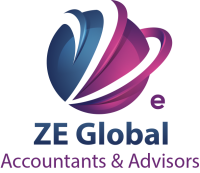
Filing Of Financial Statements
All Singapore incorporated companies are required to file financial statements (“FS”) with ACRA after the end of their financial year. Companies with less than 20 shareholders that do not have corporate shareholder may be exempted from filing their FS. They are required to submit an online declaration of solvency while completing their Annual Returns. Solvency exempt private companies (“EPCs”) are exempted from filing FS. If an exempt private firm is unable to pay its debts when they fall due, it is insolvent. EPCs that are insolvent must file their FS to ACRA.
- Companies may file their full set of FS in XBRL format OR
- They may file the key financial data in XBRL format and then include a full set of signed copy of the FS tabled at the Annual General meeting (“AGM”).
The Financial statements are compiled in accordance with the Financial Reporting Standards of Singapore and consists of
- Statement of financial position – This includes the company’s assets, liabilities, and equity.
- Statement of profit or loss – This includes the company’s profit or loss and any other comprehensive income.
- Statement of cash flows – This provides users of financial statements with a basis to assess the ability of the company to generate cash flows from its operating activities.
- Statement of changes in equity – This includes amount of dividends recognised as distribution to shareholders, changes in the company’s equity from the beginning to the end of the reporting period, and any other transactions between the company and its shareholders.
- Notes to the Financial Statement – This contains accounting policy disclosures and estimates of future uncertainties crucial to understanding the Financial Statements.
Holding Annual General Meeting
Singapore registered companies must hold Annual General Meeting (“AGM”). The purpose of the AGM is to present the company’s financial statements to its members for their analysis and, if necessary, any queries regarding the company’s stability and financial condition.
If a private company sends the financial statements to members within five months of the end of its financial year end, it can be exempted from holding an AGM.

Requirements when conducting an AGM
- An AGM must be held by listed companies within four months after their companies’ financial year end. Non-listed companies must hold an AGM within six months after their companies’ financial year end.
- A written notice of the AGM must be sent to all members at least 14 days in advance.
- Dividend declaration, the appointment and resignation of directors and auditors, the compensation of senior executives and directors, and the approval of the directors’ statements and financial statements are the ordinary business subjects covered in AGM. Any additional subjects that should be discussed must be notified in the notice of the AGM, otherwise, any resolutions adopted thereon may not be enforceable.
- In order for an AGM to be valid, a quorum, or the statutory minimum number of members, must be met by the company. If a quorum is not specifically stated in the company’s Constitution, a minimum of two members must be present.
- Directors are responsible for presenting financial statements, directors’ statements, and auditors’ reports (if any) for discussion at the AGM. These documents will be sent together with the Notice of the AGM to allow members to have reasonable times to review the documents and prepare questions for the directors.
- After the AGM, the company is required to file its Annual Returns on BizFile+.
Filing of Annual Returns with ACRA
In accordance with the Companies Act, all companies must file their Annual Returns to ACRA within five months (for listed companies) or seven months (for non-listed companies) of the end of the financial year. This is to ensure the company’s information on ACRA’s register is up to date.
The company’s details, financial statements (if required), shares, and the date of its AGM (if relevant) are the information that need to be filed. A late lodgement fee ranging from $300 to $600 may be charged if the Annual Returns are not filed on time. The information in the Annual Return is essential for stakeholders of the company to make decisions pertaining to the company.
Estimated Chargeable Income (“ECI”) and Corporate Income Tax
An ECI is an estimate of the company’s taxable income for a Year of Assessment (“YA”) taken after deducting your tax allowable expenses. All companies, including newly incorporated companies, must file their ECI to the Inland Revenue Authority of Singapore (``IRAS``) within three months from the end of their financial year.

Companies are not required to file their ECI for a YA if:
- Their annual revenue is not more than $5 million for the financial year; and
- Their ECI (before deducting the exempt amount under the partial tax exemption scheme or the tax exemption scheme for new start-up companies) is NIL for the YA.
Once your ECI has been filed, you can choose to pay your corporate income tax by instalments. Regardless of whether a company is domestic or international, the corporate income tax rate is fixed at 17% on its chargeable revenue. Filing of your ECI earlier is highly recommended because IRAS provides greater number of instalments.
A Notice of Assessment (“NOA”) outlining the amount of tax due will be sent to you after your company’s ECI has been processed. Alternatively, you can view this at mytax.iras.gov.sg. The tax is due within one month after the NOA’s date (unless you have arranged for payments in instalments).
Goods and Services Tax
Almost all the goods and services in Singapore are subject to the Goods and Services Tax (“GST”), which is a broad-based consumption tax. When a company's taxable revenue at the end of a calendar year (eg. 31 Dec) exceeds S$1 million, they are required to register for GST. They also need to register for GST if their taxable turnover in a 12-month period is expected to be more than S$1 million.
After registering for GST, companies are obligated to charge GST for their supplies. The GST charged is known as output tax, and companies are required to pay output tax to IRAS.
GST that is incurred on purchases and expenses (including the import of goods) is known as input tax. Companies can claim the input tax from IRAS upon satisfying eligibility criteria.
Companies are required to file their GST return (both input & output tax) to IRAS one month after the end of each prescribed accounting period (usually on a quarterly basis.)
GST exemptions apply to
- Financial service
- Supply of digital payment tokens
- Sale and lease of residential properties
- Importation and local supply of investment precious metals

Audit Requirements
Companies are required to appoint an auditor within 3 months of their date of incorporation unless they meet the audit exemption criteria.

A company may be exempted from having its accounts audited if it is classified as a small company with the following criteria:
- It is a private company in the financial year in question.
- It meets at least 2 of the 3 following criteria for the immediate past two consecutive financial years
| Total annual revenue | S$10m; |
| Total assets | S$10m; |
| of employees | 50. |
A company that is a part of a group may qualify for an exemption if
- It qualifies as a small company; and
- The entire group must be a “small group”.
Our company is equipped with some of the most experienced and well-equipped accountants and CAs. It means you have access to accurate accounting procedures and reports.
